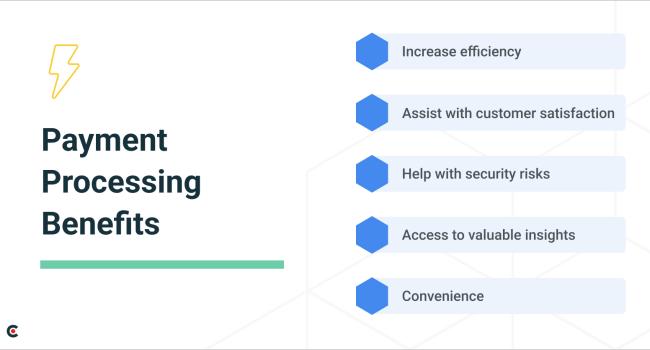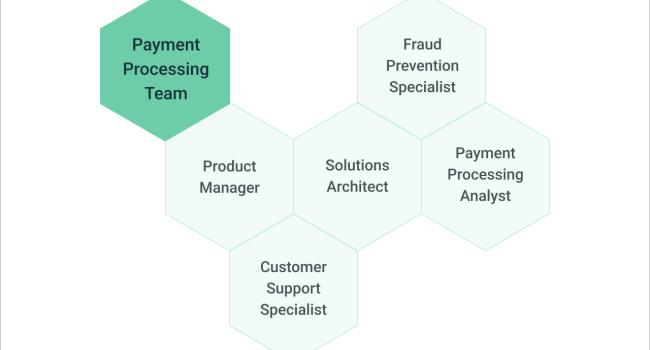Updated October 13, 2025
Payment processing services offer an array of benefits that are vital for the seamless operation and growth of businesses. From enabling secure credit and debit card transactions to streamlining operations and improving cash flow, these services play a crucial role in the e-commerce and retail industry.
In today's digital landscape, finding the right payment processing services is crucial for businesses of all sizes. Whether you're a small startup or a well-established enterprise, the process of choosing the ideal payment processing partner can be daunting.
For businesses that accept any customer payment or provide merchant services, payment processing plays a significant role in managing cash flow, enhancing client satisfaction, and preventing fraud risks.
This comprehensive hiring guide aims to provide valuable insights and practical advice to help you navigate the complexities of selecting a payment processing service that aligns with your business needs.
Browse Related Services
What is Payment Processing?
Payment Processing: The system that facilitates transactions, serving as an intermediary between businesses and financial institutions.
The process of payment processing is as follows:
- A customer initiates a payment by providing their payment information.
- Once the payment information is submitted, it’s securely transmitted to the payment gateway, which is a bridge between the customer, business, and payment processor.
- The payment processor receives the transaction data and then validates the information.
- The bank then verifies various information before sending back their authorization response – approved or declined.
- If the transaction is approved, the business completes the sale by providing the goods or services to the customer. If declined, the business may request an alternate payment option. The transaction will appear in the business’s bank account within a few business days.
- The business owners will reconcile the settled transactions through invoices, receipts, processing fees, and other account reporting.
The primary goal of payment processing is to enable secure, seamless, and efficient financial transactions between buyers and sellers. This involves securing funds from the customer's financial institution to the merchant's account, typically through electronic means such as credit or debit card payments, mobile wallets, or digital payment platforms.
By facilitating these transactions, payment processing services play a crucial role in supporting commerce, enabling businesses to accept various forms of payment and providing consumers with convenient and reliable ways to make purchases.
Along with these services, payment processing companies manage the logistics of routing transaction data between various parties to ensure efficiency.
Some of the tasks of payment processing firms include:
- Manage the flow of electronic transactions
- Facilitating the setup and management of merchant accounts, which businesses need to accept card payments
- Managing payment gateways and any technical infrastructure
- Implementing measures to detect and prevent fraud
- Resolving any payment disputes and chargebacks, involving communication with banks, card networks, and other parties to address concerns
- Providing any reporting and analytics
- Delivering customer service support
These tasks collectively contribute to the efficient and reliable processing of electronic payments, supporting businesses in accepting a wide range of payment methods and delivering a positive customer experience.
Payment Processing Services by Country
Payment Processing Services by City
5 Benefits of Payment Processing Services

The benefits of implementing payment processing services are numerous and impactful for businesses of all sizes. Here are some of the key advantages of using payment processing services:
- Increase efficiency. Payment processing systems can streamline financial transactions and expedite the overall payment process, thereby enhancing operational efficiency.
- Assist with customer satisfaction. Efficient payment processing contributes to a smoother customer experience, providing convenience, faster transactions, and secure payment options, ultimately improving customer satisfaction.
- Help with security risks. Payment processing companies spend a lot of time and resources to ensure the security of their services to combat any risks.
- Access to valuable insights and reporting. Payment processing integration can provide businesses with valuable accounting insights, transaction data, and reporting analytics, supporting informed decision-making for small businesses and other businesses.
- Convenience. Payment processing services enable businesses to accept debit and credit card payments, offering customers greater convenience and flexibility in purchasing.
What Offerings Do Payment Processing Companies Provide?
Payment processing companies provide a range of offerings to facilitate electronic transactions and support businesses in managing their payments. Here are some common offerings provided by payment processing companies and the goals of each:
- Transaction Processing
- Payment Gateway Services
- Merchant Accounts
- Security & Fraud Protection
- Reporting & Analytics
- Customer Support
Transaction Processing
Transaction processing involves managing and settling electronic payments and online transactions, no matter the medium.
By efficiently capturing, processing, and storing transaction data, payment processing companies play a critical role in supporting the day-to-day operations of businesses and ensuring the smooth execution of transactions.
Payment Gateway Services
A payment gateway service is a crucial component of payment processing, serving as the technology that enables secure transactions.
These services facilitate the transfer of payment data between the merchant's website or point-of-sale system (POS system) and the payment processor or acquiring bank. They are vital for businesses looking to accept electronic or credit card payments, whether online or in person.
With payment gateway services, payment processing companies are in charge of providing secure technology infrastructure for online and mobile payment processing, enabling businesses to accept online payments through various digital channels.
Merchant Accounts
Merchant accounts are specialized bank accounts that enable businesses to accept various forms of electronic payments, such as credit cards, debit cards, and other electronic transactions. These accounts play a crucial role in processing customer payments and are essential for businesses that engage in electronic commerce.
Payment processing companies facilitate the setup and management of merchant accounts, allowing businesses to accept and process different forms of payment at checkout.
Security & Fraud Protection
Payment processing companies implement measures to ensure payment data security, including encryption, tokenization, and fraud detection to safeguard against unauthorized transactions.
Reporting & Analytics
Payment processing companies can offer insights into transaction data, sales trends, and customer behavior through reporting tools.
Customer Support
Payment processing companies provide assistance for businesses and customers regarding payment-related inquiries, technical problems, and general support needs.
How to Assess Payment Processing Services
It is essential for businesses to track and measure the performance of their payment processing services because it helps them identify areas for improvement while optimizing the efficiency of their payment systems.
By tracking these measures, businesses can meet with their payment processing company to have a dialogue about what needs to change or what needs to be continued. Common KPIs for payment processing services include:
- Processing Speed: The time it takes to receive a response for a payment transaction.
- Conversion Rate by Payment Method: Tracking the conversion rates associated with different payment methods can provide insights into the effectiveness of each method in driving successful transactions.
- Bank Approval Rate: The rate at which banks approve or decline payment transactions helps evaluate the overall performance of a payment processing system or company.
- Transaction Volume: This measures the total number of payment transactions a company processes within a specific period.
- Payment Conversions: Monitoring the percentage of successful transactions helps evaluate the effort's overall performance.
What is a Payment Processing Team?
Payment processing companies have different roles, but all team members play a crucial part in ensuring the smooth operation and reliability of payment processing systems for their clients.

Here are some of the common roles associated with payment processing services:
Who Makes Up a Payment Processing Company?
- Product Manager: This individual oversees the development and management of payment account solutions, collaborating to drive product strategy.
- Solutions Architect: This team member works closely with the product manager to implement payment solutions, providing the needed technical expertise.
- Payment Processing Analyst: This individual analyzes and designs payment solutions while focusing on improving efficiency and security.
- Fraud Prevention Specialist: This team member monitors transactions, while developing strategies to detect and prevent fraudulent activities.
- Customer Support Specialist: This individual provides dedicated support to businesses and their customers, addressing any inquiries and issues related to payment processing.
What To Look For When Hiring Payment Processing Services
Finding the right company to manage your payment processing services. There are plenty of professionals that specialize in the service, but how do you find the right one for your business?
For most companies, the most important factors include their level of customer support, how they work with budgets, their flexibility, and of course, how they understand business needs.
By thoroughly considering these aspects, businesses can make informed decisions when selecting a payment processing service that best aligns with their operational needs and long-term objectives.
Criteria for Hiring a Payment Processing Company
- Budget
- Industry experience
- Location
- Service quality
- Flexibility
- Knowledge of industry compliance and regulations
- Expertise in data security
A valuable approach to gathering insights on potential partners is to delve into client reviews on B2B ratings platforms such as Clutch.
By perusing first hand feedback from actual clients, you can uncover crucial details about the range of services provided by each company, their pricing, and the satisfaction levels of past clients with their performance.
What Matters to You Most in Payment Processing Services?
If you’re looking for payment processing services, your business is likely looking for an efficient way to run and grow your business while satisfying clients with seamless transactions.
At the beginning stages of this process, companies should educate themselves on various aspects of the payment processing world to see what they’re looking for in a payment processor.
You can request a proposal or begin shortlisting potential providers by pinpointing the criteria for hiring a payment processing service provider.
When interviewing potential payment processing companies, your business must evaluate their quality of work, experience with e-commerce platforms, knowledge of different functionalities, and approach with transparent pricing.
Here are a few questions you should ask when interviewing payment processing service providers:
10 Questions to Ask When Hiring Payment Processing Services
- What is your onboarding process like, and how long does it take to start processing payments?
- What types of payment methods can your system support?
- How do you ensure the security of transactions and protect sensitive customer data from fraud and breaches?
- What integration options do you offer for seamless compatibility with our existing systems?
- Do you offer support for omnichannel payments, including online, in-store, mobile, and recurring billing?
- How do you provide transaction reporting and insights to help customers understand their payment activity?
- What level of customer support do you offer, including access to technical assistance, account management, and other payment-related issues?
- Can you accommodate technological advancements such as contactless payments or other emerging payment methods?
- What is your collaboration approach when working with clients?
- Can you provide a breakdown of your fee structure, including transaction fees, monthly fees, and any other applicable costs?
Asking these questions will help your business evaluate your options for a payment processing service. Be sure to scope out your goals and objectives, and then create a timeline to ensure everyone is aligned before your project begins.
Making Informed Decisions for Your Payment Processing Needs
The process of hiring a payment processing service demands careful consideration and informed decision-making. Businesses can effectively evaluate and select the right payment processing partner by understanding key factors such as fees, security, integration capabilities, customer support, and scalability.
It's essential to prioritize transparency, reliability, and the ability to adapt to evolving industry trends. Ultimately, the chosen payment processing service should meet current business needs and have the flexibility to grow alongside the company.
With the insights provided in this guide, businesses are well-equipped to embark on the journey of finding a payment processing solution that aligns with their unique requirements and sets the stage for long-term success.















